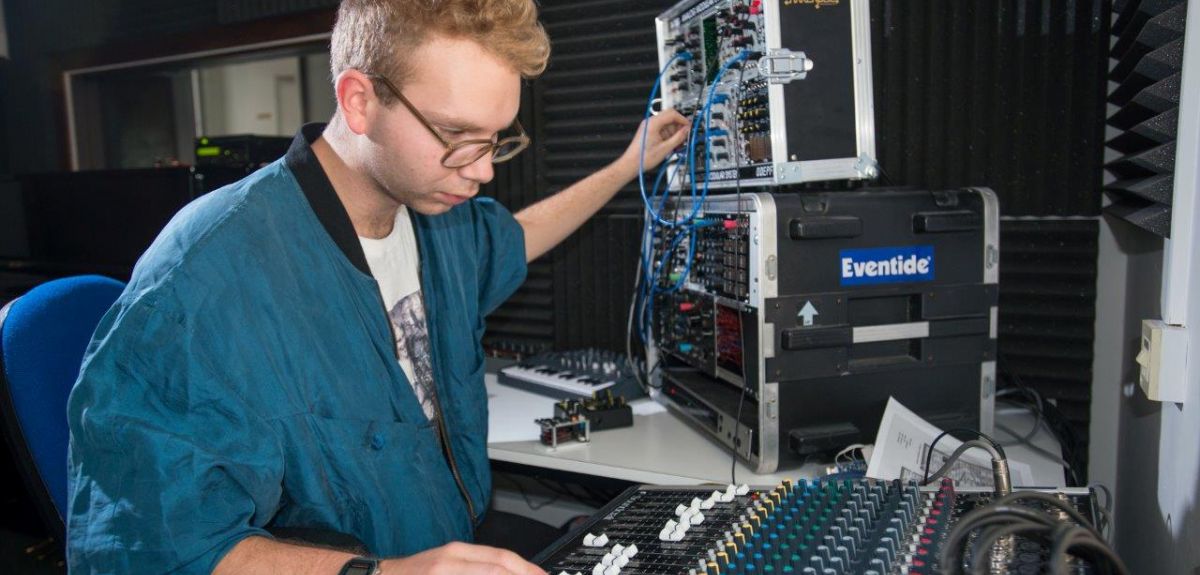
Electronic music competition launched by Oxford University
A national competition to find the most innovative new works in electronic music has been set up by Oxford University, to build on the increasing importance of electronic music in the University’s teaching and research programmes.
A national competition to find the most innovative new works in electronic music has been set up by Oxford University, to build on the increasing importance of electronic music in the University’s teaching and research programmes.
The Oxford/Sennheiser Electronic Music Prize (OSEMP), organised by the Faculty of Music at Oxford University and audio specialists Sennheiser, with support from Warp Records, is open to all UK-based composers under 35 working in all genres of music, from modernist classical work to dance music and sound installations.
Daniel Hulme, Electronic Music Studio Manager at the Faculty of Music, said: ‘We have already received some incredible pieces of music, and we are excited to hear new submissions. We hope to explore and uncover new talent, including young composers who have not yet found their platform.’
Finalists will perform their pieces at a showcase event in Oxford this winter, to a panel of judges including Oxford academics and award-wining electroacoustic composer Natasha Barrett.
As the former home of great classical composers like Hubert Parry and John Taverner, Oxford University might not seem to be a natural bedfellow for electronic music. But Mr Hulme says that electronic music is now a vital part of the Faculty’s teaching and research.
'There is a huge interest in electronic music and music technology amongst our own students and this has been reflected in recent changes to our teaching and research programmes,' he said. 'We opened a brand new electronic music studio last year, with support from Sennheiser. It's called OSCaR: the Oxford Surround Composition and Research studio. Our students can now compose and mix in a multi-speaker surround environment.
'We now have the facility to write music to picture, which is popular with students wanting to gain experience of writing music for film or TV. Teaching at the Faculty now includes classes in “computer music”, using the programming environment Max-MSP to enable students to design and build their own bespoke software instruments and audio effects.'
The results of the expansion of teaching and research in electronic music at Oxford are already beginning to show. 'A number of our students have set up the Oxford Laptop Orchestra (OxLOrk), which composes and performs live electronic and electroacoustic music using computer technology,'said Mr Hulme.
'One of our recent DPhil students produced a programme using Max-MSP to generate music for a video game, based on the player’s input and progress through the game.'
The rise of electronic music has allowed composers to use new techniques to produce sounds that were previously impossible and extend the range of traditional acoustic instruments. Mr Hulme said: 'Ever since the introduction of widely-available tape recorders after World War Two, composers have been manipulating sound to push the boundaries of music. Oxford built its first experimental recording studio in the 1980s to allow research into this 'tape music'. Back then composers had to physically cut the tape and splice it together; the limitations of the technology forced a new kind of creativity.
'But as computers have become the main workhorse in the studio these limitations have been lifted, which I think has led to an over-reliance on the technology and a decline in originality. We hope OSEMP can help to counter this. Competitors can submit entirely studio-based compositions, or hybrids of acoustic instrumental performance with live electronics and processing, and we are calling for submissions to be both innovative and communicative.'
 Expert Comment: Chatbot-driven sexual abuse? The Grok case is just the tip of the iceberg
Expert Comment: Chatbot-driven sexual abuse? The Grok case is just the tip of the iceberg
 New study finds that stopping weight-loss drugs is linked to faster regain than ending diet programmes
New study finds that stopping weight-loss drugs is linked to faster regain than ending diet programmes